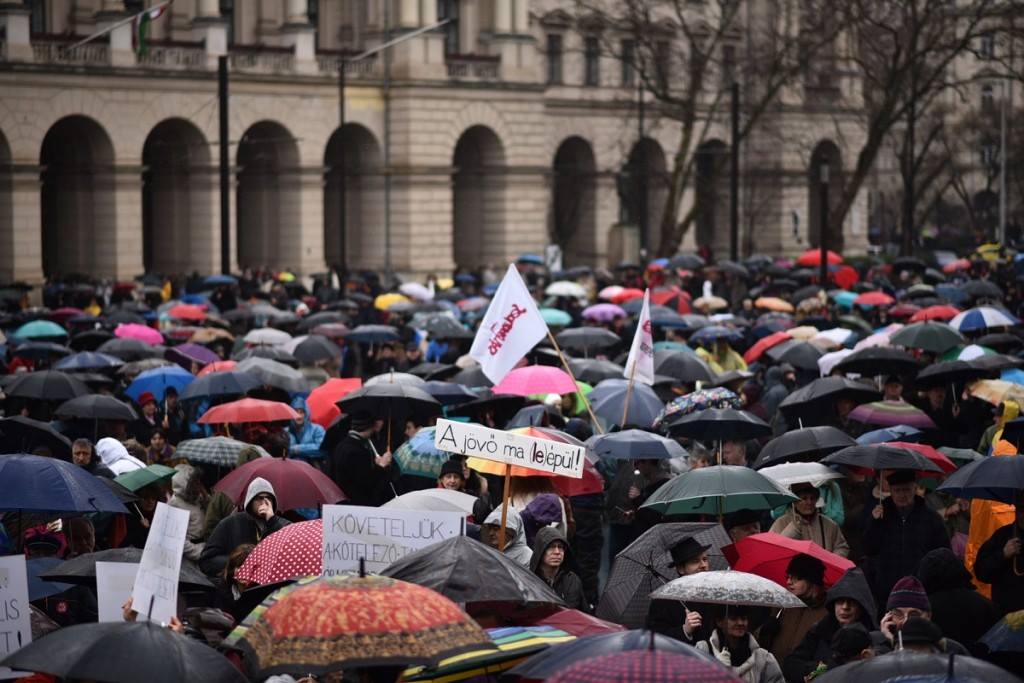Hungary : Strikes and demonstrations throughout the schoolyear
Published:
Last autumn, teachers in Hungary had enough of the nationalisation of public education institutions, but also of overwork for academic staff and students alike, administrative burdens, the unfair salary system and the imposed code of ethics. One of the most important unions in the education sector, PSZ (Pedagógusok Szakszervezete), the Hungarian Teachers Union, gave the government a list of 25 demands and asked that it engage in immediate negotiations.
PSZ, a member of the national strike committee, started negotiating with the government in January 2016. From the outset it was clear that the Education Ministry was not open to discussing fundamental changes in the public education system. The government also tried to influence public opinion through its communications, for example by accusing teachers who had already received a substantial salary increase of wanting always more. It also portrayed teachers’ protests as mere salary demands, in an attempt to pit teachers against the rest of society.
Faced with the situation, PSZ organised a demonstration in front of the Parliament on Kossuth Square in Budapest on 13 February 2016. Tens of thousands of demonstrators – as many as 50,000 according to some estimates – participated in the rally. Teachers, early childhood teachers and VET personnel converged on Budapest from all regions. It was raining in Budapest that day, and people now refer to the event as the ‘demonstration with the umbrellas.’ Workers from other sectors also joined the demonstration in solidarity, reflecting the fact that many issues like social security, the public health system and cultural institutions also impact other sectors.
Following the demonstration, the government changed its attitude a little, made a number of proposals and created a new structure for social dialogue called the ‘Public Education Round Table.’ The problem, however, is that the dialogue is too formalistic, with all invited participants coming from organisations close to the government. PSZ was also invited but remains firmly of the view that it should negotiate with the government only as part of the strike committee. The reason is that only consultations are foreseen in the Round Table, whereas the law imposes that the government conduct negotiations with the strike committee.
Teachers are demanding first that the current policy of nationalising public education institutions be changed and that local authorities be allowed to manage primary and secondary schools when they can afford to do so. Teachers also want to choose their textbooks freely. The government did not accept many of the teachers’ demands and so PSZ was forced to call a general strike. On 20 April 2016, workers from 1,200 ECE, primary and secondary schools went on strike. Workers from day care centres also joined the strike in solidarity. Trade unions from other sectors expressed their solidarity by slowing down traffic or interrupting work for five minutes at noon, while parents and grandparents gathered in front of schools.
PSZ is currently preparing new actions. In Hungary, the first Sunday of June is traditionally national teachers’ day. On 5 June, PSZ will organise a lesson in Hungarian literature on a public square in Budapest, during which contemporary authors will discuss literature with students and teachers.
Negotiations between the strike committee and the government are however on-going. What is clear is that the next schoolyear should not start under these conditions.
Pictures of the demonstration in February:
http://pedagogusok.hu/tuntetes20160213
Pictures of the strike actions in April:
https://www.facebook.com/pedagogusok.szakszervezete/photos